- News
- Reviews
- Bikes
- Accessories
- Accessories - misc
- Computer mounts
- Bags
- Bar ends
- Bike bags & cases
- Bottle cages
- Bottles
- Cameras
- Car racks
- Child seats
- Computers
- Glasses
- GPS units
- Helmets
- Lights - front
- Lights - rear
- Lights - sets
- Locks
- Mirrors
- Mudguards
- Racks
- Pumps & CO2 inflators
- Puncture kits
- Reflectives
- Smart watches
- Stands and racks
- Trailers
- Clothing
- Components
- Bar tape & grips
- Bottom brackets
- Brake & gear cables
- Brake & STI levers
- Brake pads & spares
- Brakes
- Cassettes & freewheels
- Chains
- Chainsets & chainrings
- Derailleurs - front
- Derailleurs - rear
- Forks
- Gear levers & shifters
- Groupsets
- Handlebars & extensions
- Headsets
- Hubs
- Inner tubes
- Pedals
- Quick releases & skewers
- Saddles
- Seatposts
- Stems
- Wheels
- Tyres
- Health, fitness and nutrition
- Tools and workshop
- Miscellaneous
- Buyers Guides
- Features
- Forum
- Recommends
- Podcast
news
Cyclists blast Mail’s “appalling lie” that LTN stopped doctors visiting patients; Yellow cards introduced to pro cycling to clamp down on dangerous riding and driving during races; Keir Starmer: Labour is “on the side of drivers” + more on the live blog
SUMMARY
No Live Blog item found.
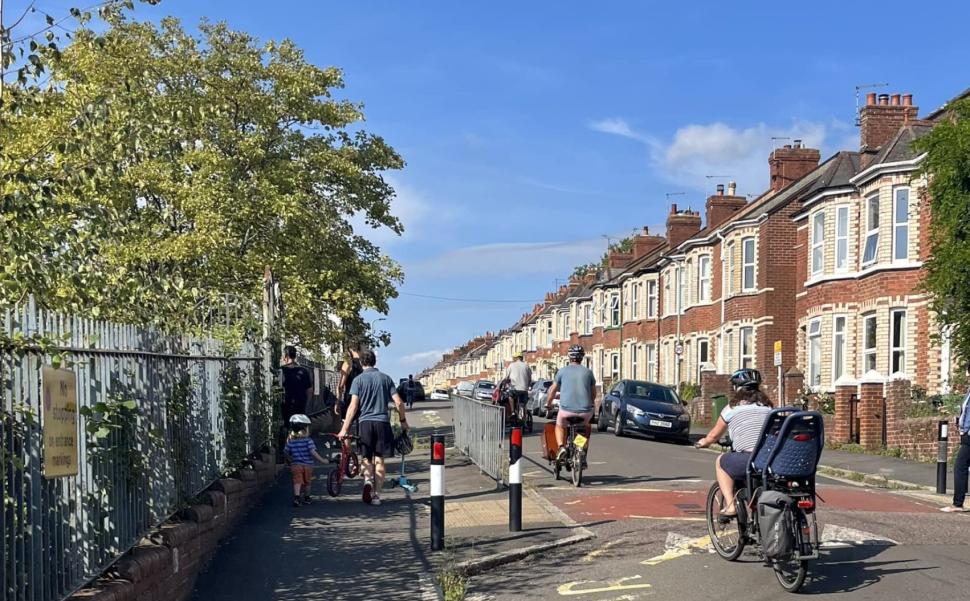 Heavitree and Whipton Active Streets trial, Exeter (Heavitree and Whipton Liveable Neighbourhood Group)
Heavitree and Whipton Active Streets trial, Exeter (Heavitree and Whipton Liveable Neighbourhood Group)12 June 2024, 13:51
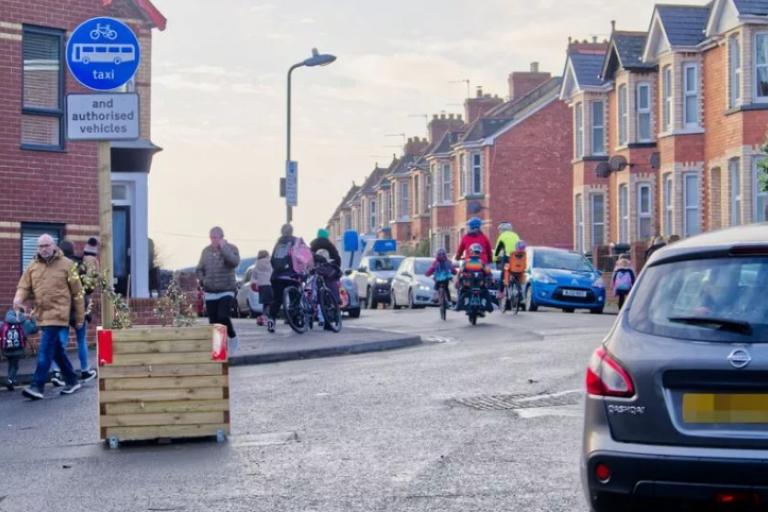
Stop Killing Cyclists group blasts Mail and Times’ “appalling lie” that Exeter’s now-scrapped Low Traffic Neighbourhood blocked doctors from visiting patients – and says scheme made lives “radically safer”
Few debates around Low Traffic Neighbourhoods in the UK have been as divisive, protracted, and ultimately disheartening as the Heavitree and Whipton Active Streets scheme in Exeter.
And that’s saying something.
After an attempt to scrap the scheme just four months into his proposed 18-month trial period was warded off by a concerted effort by local active travel campaigners in January, things finally came to a head last week, when councillors voted to put an early end to the initiative in what was described by local cyclist and Rouleur editor Edward Pickering as a “victory for reactionary politics”.
After months of confusion and uncertainty – and shocking incidents involving motorists driving at residents acting as ‘human bollards’ and children being knocked off their bikes – the Labour chair of Exeter’s Highways and Traffic Orders Committee (HATOC) “reluctantly” agreed to implement the findings of a report by an unelected official, who argued the scheme should be stopped “as soon as possible” after 82 per cent of respondents to the council’s impact assessment opposed the traffic-calming measures.
However, Exeter Cycling Campaign claimed that report betrayed the council’s promise to deliver a full 18-month trial and pointed out that the scheme met its aims of boosting active travel and reducing car journeys.
However, rather unsurprisingly, some corners of the national press weren’t as up in arms about the scheme’s removal.
A recent article in the Daily Mail claimed that the LTN was “deeply unpopular” and “blighted the lives of locals with longer commutes and extra congestion”, while the Times led with “Exeter rejoices as low-traffic scheme scrapped”.
Locals interviewed by the Times, and repeated in the Mail’s report, included Tracy Courtney, who said she was “forced to drive extra miles and spend longer in traffic on her way to and from work at the Royal Devon and Exeter Hospital” due to the LTN.
And Shannon Mac, the administrator for the Heavitree and Exeter Community United Facebook group, said she was delighted at HATOC’s decision because she believes the scheme was “creating inequities”.
“Some older people became isolated, shops didn’t get the same level of passing trade, doctors couldn’t do home visits, carers had to cut the time spent with patients, and the list goes on. I still cannot comprehend how those who wanted the LTN can shut their eyes to obvious suffering,” she said.
One of Mac’s claims, repeated in the Mail and the Times – that doctors weren’t able to visit patients at home – has attracted the ire of the road safety campaign group Stop Killing Cyclists, who described that particular allegation as “an appalling lie”.
DO YOU LOVE SAFER ROADS FOR KIDS?!
Daily Mail wants to hear from people living in LTNs sam.lawley [at] mailonline.co.uk
Mail just lied that Exeter LTN "blocked doctor from visiting patients"!
If you LOVE your LTN let them knowhttps://t.co/qj3nLvzq4O@StopKillingCycl @countcaspargh pic.twitter.com/SbXO3yv8cs— Donnachadh McCarthy (@DonnachadhMc) June 12, 2024
Calling on Exeter locals, and other pro-LTN campaigners, to contact the Mail to highlight the support for the schemes across the UK, Stop Killing Cyclists’ Donnachadh McCarthy wrote this morning: “The Mail has just told the appalling lie that the Exeter LTN blocked doctors from visiting patients!
“Every home in every LTN is accessible by car, they just cannot use rat runs to race through residential communities. Parents, kids, disabled, pensioners etc whose lives have been radically made safer are wanted to let them know how much you love your safer LTN.
“Studies show an up to 70 per cent cut in crashes in LTNs, with NO increase in crashes on boundary roads.
“We suggest the title of your email should not indicate you love your LTN, so that they have to open the email to read your views. Otherwise, they will just ignore it, as it does not support their blood drenched Motorist War On Kids campaign.”
Speaking to Devon Live this week, locals in support of the Exeter LTN said they were “hugely disappointed” to see it removed, and claimed that local councillors “gave in to bullying from a loud minority”.
“I saw a big increase in people travelling actively to school and a decrease in cars in Heavitree. I’m hugely disappointed to see the LTN removed,” local mum Harriet Sharp said.
“I feel the councillors gave in to bullying from a loud minority. I know the argument back to this is that 82 per cent of consultation responses were against the LTN, but I’m also hugely disappointed that Devon County Council carried out such a poor consultation.
“They were not even able to say which responses were duplicates or came from inside Heavitree and Whipton, let alone inside Exeter. I feel the consultation was ‘gamed’ by the anti-crowd to make the LTN look poorly received. In reality, I would say that speaking to neighbours there was largely strong support or neutral feelings.”
Meanwhile, Exeter-based Pickering said the decision has “let down future generations”.
“I’m hugely disappointed. The trial was a rare piece of progressive and positive policy regarding Exeter’s transport infrastructure, aimed at solving several problems at once,” the cycling writer said.
“Now it’s been scrapped, these problems will continue to get worse, as they have over generations. We can expect our pollution levels to remain high and increase, our traffic jams to continue to get worse, for conditions associated with sedentary lifestyles – obesity, diabetes etc – to continue to rise, and for people to be more exposed to the danger posed by the drivers of motor vehicles.
“Road damage by heavy vehicles will increase, and our residential streets, which should be for people first, will be noisier and dirtier. These are terribly pressing issues, and promoting active travel is a cheap way of solving all six of these issues at once, and more – it’s a silver bullet for policymakers.”
12 June 2024, 16:35
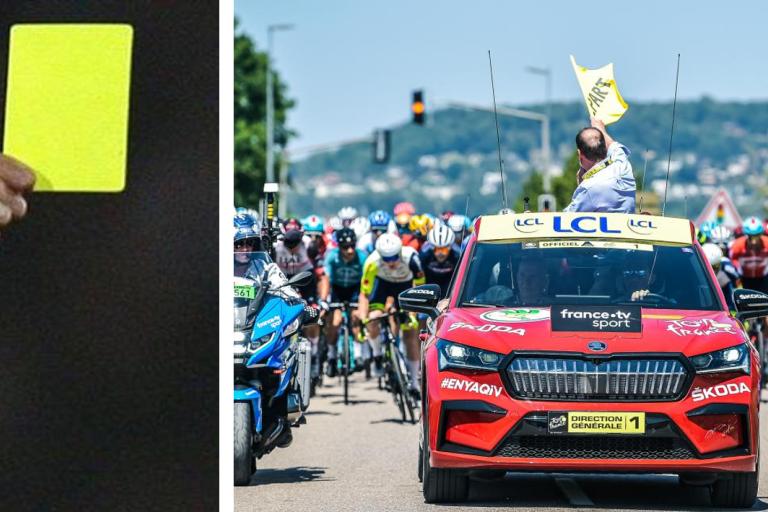
“That’s a clear yellow, ref!” UCI to introduce yellow card system to clamp down on dangerous riding and driving during races, while restrictions on earpieces also considered as part of attempt to address safety concerns in pro cycling
Everyone’s favourite no-nonsense referee, Pierluigi Collina, may soon be expecting a call from the UCI, after world cycling’s governing body announced this afternoon that it plans to go down the football route by introducing a yellow card system designed to dissuade riders and sports directors, as well as other drivers and motorbike riders, from engaging in dangerous behaviour during races.
The new yellow card method of clamping down on what the UCI calls “bad conduct” comes as part of a suite of new measures the governing body hopes will promote safety at professional road races, after an increasingly long string of high-profile and serious crashes and incidents and calls for change in recent years.
Along with the introduction of yellow cards, the UCI says it will also test the effects of restricting the wearing of earpieces during races, while – in a bid to make bunch sprints safer and less stressful – modifying the current 3km rule for GC time gaps and simplifying the method of calculating time gaps in group sprints.
(Zac Williams/SWpix.com)
The new measures are based on recommendations from the UCI’s SafeR initiative, launched in June 2023 (just weeks after Gino Mäder’s tragic death at the Tour de Suisse) to help improve safety in the bunch and unite cycling’s key stakeholders in their approach to the issue.
According to the UCI, the yellow cards system will be introduced, first as part of a trial phase, on 1 August and will apply to both men’s and women’s professional road races.
While the cards won’t physically exist – so the prospect of a commissaire running after a grumpy DS brandishing a yellow unfortunately won’t come to fruition – they will be listed in the race communiqué and will, the UCI hopes, “have a dissuasive effect on anyone present in the race convoy (riders, Sport Directors, other drivers and motorbike riders, etc.) who might engage in behaviour that could jeopardise the safety of the event”.
“In addition, the system will aim to make all these people more responsible by introducing the monitoring of bad conduct over time and consequently encouraging respectful behaviour,” the governing body says.
To do so, anyone found guilty of breaching the UCI’s current safety rules could be on the receiving end of a yellow card (along with the traditional sanctions imposed), with two yellow cards at the same race leading to the individual being disqualified and suspended for a week.
Anyone who receives three yellow cards within a thirty-day period will also be suspended for 14 days, while six yellow cards in the space of a year will lead to a 30-day suspension.
Good job Roy Keane isn’t a cycling sports director, then.
The UCI says no sanctions, however, will be imposed during the trial period, but that they will come into effect, pending review, from 1 January 2025.
Meanwhile, in a move likely to garner favour with cycling traditionalists, the UCI has also decided to test the effects of a restriction on wearing and using earpieces in races at unspecified races this year.
“This decision is based on discussions on the subject within SafeR, which led to the conclusion that earpieces could be both a source of distraction for riders and a physical hazard because the radio units are mounted on their backs, and represent a risk when a large number of teams are simultaneously asking their riders to move up to the front of the race,” the UCI said, adding that other measures, such as limiting the use of earpieces to one rider per team, will also be considered.
(Zac Williams/SWpix.com)
The three-kilometre rule, introduced in 2005 and which allows a rider who has suffered a crash or mechanical problem in the final 3km of a race to be credited with the time of the group they were in at the time of the incident, will also be modified, allowing organisers to increase the buffer zone to 5km in certain circumstances before a race.
“This measure is intended to take account of the increase in traffic calming infrastructure – sources of danger for the pelotons – within an ever-greater radius of the race finish sites. Extending the zone in which the rule applies, when necessary, will reduce the pressure on riders during the phase of the race leading up to the final sprint,” the UCI says.
And finally, in a similar bid to add some calm to the chaos of a bunch sprint (especially for GC riders), the method for calculating time gaps in mass finishes will be simplified, with gaps between groups only being counted after three seconds, instead of one.
The UCI continued: “This systematisation of the three-second rule is intended to simplify the calculation of time gaps at stages with an expected bunch sprint, to relieve the pressure on riders not directly involved in the sprint and to allow them to leave a certain margin with the front of the race – three seconds corresponding to a gap of 50 metres rather than 17 metres for a one-second gap – and to thus reduce unnecessary risk-taking, particularly for riders aiming for the overall classification.”
Both of these new sprint rules will be tested at the Tour de France before a final decision is made.
Along with these new racing rules, the SafeR project will also work with experts to carry out equipment studies (such as on hookless rims with tubeless tyres, after Thomas De Gent’s spectacular blowout at the UAE Tour, helmets, and skinsuits) in order to define what equipment issues are contributing to crashes, possibly leading to tighter regulations on manufacturers.
“The safety of riders is a priority for the UCI, and it was with this in mind that we created SafeR, a structure dedicated to safety, bringing together the main stakeholders in professional road cycling,” UCI President David Lappartient said today.
“I am convinced that the measures announced today, which are the fruit of the work of this new body and which affect many aspects of the road racing ecosystem, will enable us to make progress towards a safer sport.”
“SafeR has provided a platform for me to address the riders’ number one concern: safety in races,” added Adam Hansen, the president of the CPA riders’ union.
“Feedback has shown that the majority of riders wanted the 3km rule extended to reduce stress during hectic race finales. I am thrilled that this will be tested at some sprint finals at the Tour de France, and I thank the UCI and ASO for allowing it.
“Additionally, a large survey conducted last year indicated the need for a yellow card system in cycling, which will be tested in the coming months before being implemented next year. These initial measures recommended by SafeR to the UCI demonstrate that riders’ requests are being heard and acted upon. It is crucial, and we are making significant progress in this area. There is still much work to be done, and I look forward to continuing the solid work that has begun.”
12 June 2024, 17:39
That’s all folks! Warner Bros sell GCN back to founders
12 June 2024, 08:06
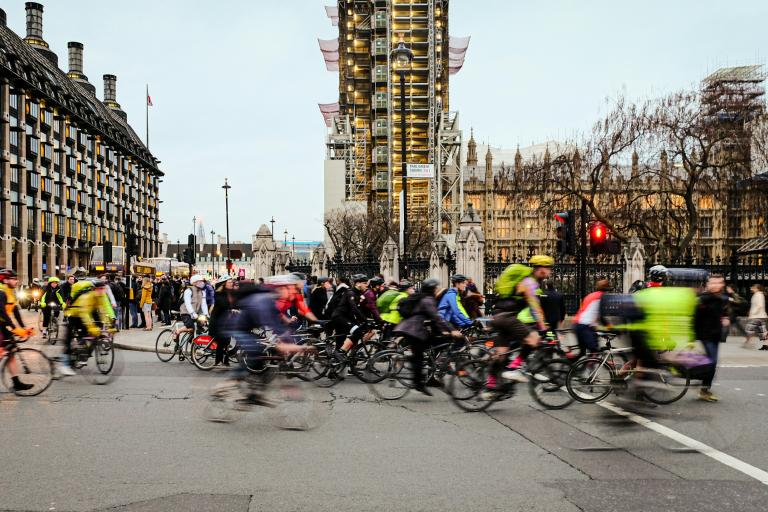
“People need to have other options. Not just more cars”: Keir Starmer’s claim that Labour is “on the side of drivers” slammed by cyclists who ask, “How about everybody else?” and “What about protecting vulnerable road users?”
Be careful what you wish for, they all say. And that’s especially the case when it comes to British politics and active travel.
After suggesting that cycling and walking had been conspicuous by their absence in the election debates so far on last week’s edition of the road.cc Podcast, transport and travel have now rocketed to the forefront of the political consciousness over the past 24 hours.
But not quite in the manner we may have hoped.
> Does cycling policy need a reset after the election?
Following the Conservatives’ rather blundering manifesto launch yesterday, Cycling UK argued that Rishi Sunak’s chaos-inflicted party were “prioritising what they think drivers want rather than delivering better transport for all”.
“In a diversion from the government’s 2020 Cycling and walking Investment Strategy (CWIS), the Conservatives are deprioritising active travel and pushing for a new ‘Backing Drivers Bill’,” the charity said. “We want the next Government to provide greater choice for how people travel rather than focusing on ways to encourage driving.”
So, with the Tories firmly intent on ‘backing drivers’, what’s Labour’s plan? Errr, to back drivers, apparently.
It’s time to clear up the mess the Tories have left our roads in.
Labour is on the side of drivers.
🔧 1 million more potholes every year fixed.
💷 Soaring car insurance costs tackled.
👷♀️A long term plan to make our roads safer, reduce traffic and speed up works.— Louise Haigh (@LouHaigh) June 11, 2024
In the party’s manifesto, which is set to be launched tomorrow, Labour will pledge to “clear up the mess the Tories have left our roads in” by earmarking an additional £320 million to fix a million potholes a year, ending the “sticking plaster approach” to roads repairs by providing multi-year funding settlements to local councils.
Labour also say they will crack down on rising car insurance prices and ensure faster decisions on road upgrades in what – wait for it – Keir Starmer and his colleagues are calling their “plan for drivers”.
“Cars are a lifeline for millions up and down the country,” Shadow Transport Secretary Louise Haigh – who just last week promised support for local authorities to provide safe, accessible cycling infrastructure, so “everyone who wants to cycle can” – told the Mirror.
“They get people to work, allow parents to get kids to school and help carers support relatives – but drivers have been totally failed by this Conservative government.
“The Conservatives have left Britain’s roads plagued with potholes and have sat back as car insurance costs have spiralled out of control. Labour is the only party truly on the side of drivers.”
While cyclists can certainly welcome Labour’s proposals to reduce traffic, make the UK’s roads safer, and fix the country’s extremely dangerous pothole manifestation – “Fixing potholes keep people who use a bicycle safe,” Wandsworth councillor and active travel campaigner Jo Rigby noted after the announcement – it’s the ‘on the side of drivers’ rhetoric that has left some cyclists feeling uneasy about Starmer’s plans.
And it’s rhetoric the Labour leader, and probable future PM, repeated this morning on social media.
Labour is the only party on the side of drivers, with our plan to fix up to one million more potholes every year and crack down on soaring car insurance costs.
— Keir Starmer (@Keir_Starmer) June 12, 2024
“Labour is the only party on the side of drivers, with our plan to fix up to one million more potholes every year and crack down on soaring car insurance costs,” Starmer said on Twitter.
It’s safe to say, many cyclists aren’t impressed with that Sunak-lite stance on cycling and active travel.
“Disappointing to see this from Labour. Borrowing rhetoric from the Tories – ‘on the side of drivers’,” Active travel researcher and former Labour analyst Jamie Furlong said on X.
“This country desperately needs better functioning public transport and safer environments for walking and cycling. People need to have other options. Not just more cars.”
> Rishi Sunak is “on the side” of drivers – What happened to Britain’s “golden age for cycling”?
“Disappointing Labour have been pulled into this nonsense,” concurred Ciaron. “Governments have always prioritised drivers, how about everybody else?”
“What about encouraging active travel and protecting vulnerable road users?” asked Stirzy.
“Please don’t start with the same ‘on the side of drivers’ nonsense as the Tories. Be on the side of people: Pedestrians, cyclists, public transport users, and drivers. Drivers are not a separate species.”
“People who drive are not just drivers,” agreed Jackie Ballard. “We are also pedestrians, cyclists, and parents – we want clean air, a healthy environment for nature and wildlife, and safe streets.”
“I didn’t know we had to pick sides,” said Kieron. “I’m going to stick to being someone who drives but prefers to ride a bike and wants better public transport.”
“Welsh Labour have shown the way – scrap the road building budget (we’ve enough roads), a national default 20mph speed limit, and transfer some of the road budget to create safe walking and cycling routes for everyone,” A56 Safety Campaign added.
However, not all cyclists were up in arms about Labour mimicking the Conservatives’ pro-driver rhetoric.
“Lots of anger about this but it’s just a political answer to the Tory attack,” East London-based cargo bike rider (and Christmas tree carrier) Rich from East London countered.
“The plan is basically just fixing potholes (good for cycling) funded by cancelling a big new road project (good). More important to see what they do for active travel and public transport.”
Well, that’s the big question, isn’t it? I suppose we’ll find out tomorrow…
12 June 2024, 15:56
Racing round-up: Great day for Norwegian cycling (and the ‘æ’ character) continues with Søren Wærenskjold time trial win at the Tour of Belgium, as Dylan Groenewegen beats Alexander Kristoff in Slovenia
You know the Tour de France is fast approaching when there’s three stage races on at the same time…
And away from the mountain-top action in Switzerland, the tours of both Belgium and Slovenian got underway this afternoon, with Uno-X’s Søren Wærenskjold building on fellow Norwegian Torstein Træen’s Swiss win by securing his second successive time trial win in as many years at the Baloise Belgium Tour, beating Lidl-Trek’s Mathias Vaeck by just two seconds over the 12km course.
Søren Wærenskjold has set the new best time. Can he win the Baloise Belgium Tour TT for the second year in a row?
⏱️ Top time: 13’24”#BaloiseBelgiumTour#Beringen pic.twitter.com/bZBAzcluDL
— Baloise Belgium Tour (@belgium_tour) June 12, 2024
Meanwhile, Dylan Groenewegen continued his recent return to winning ways by narrowly pipping the evergreen Alexander Kristoff right at the line in a super tight sprint at the Tour of Slovenia:
Poderoso sprint de 🇳🇱Dylan Groenewegen (Team Jayco AlUla) para llevarse el sprint masivo de la 1ª etapa de 🇸🇮Tour of Slovenia (https://t.co/a3gwxLkIDE) y se convierte asimismo en el primer líder de la carrera. 3ª victoria del holandés de la temporada #TourOfSlovenia pic.twitter.com/XT9U2wputa
— Diego (@ciclodelmundo) June 12, 2024
It’s beginning to feel a lot like summer (in the cycling calendar, anyway)…
12 June 2024, 15:45
Zwift has made a bike! Well, kind of...
12 June 2024, 15:22
“The ‘on the side of drivers’ framing does little to inspire our country to live healthier, greener lives”: Cycling UK responds to Labour’s Plan for Drivers
Labour is on the side of drivers. pic.twitter.com/i0ROZLU3HE
— The Labour Party (@UKLabour) June 12, 2024
Cycling UK has become the latest active travel group to respond to Labour’s much-discussed Plan for Drivers, with the charity offering a balanced take of Starmer and co.’s proposals, but criticising its framing.
“We have consistently called for plans to reduce traffic and Labour’s proposal for better buses and trains are a welcomed step in that direction, although further detail is needed,” Sarah McMonagle, director of external affairs at Cycling UK, said this afternoon.
Have you got a problem with Britain’s roads? pic.twitter.com/Q9MJEIgjjF
— The Labour Party (@UKLabour) June 12, 2024
“The Party's plan to also create a long overdue new road safety strategy echo calls we've made in the past.
“But framing this plan as transport policy to put Labour on the side of drivers does little to inspire our country to live healthier, greener lives.
“Beyond lower repair costs, fixing our nation's potholes will save lives. One cyclist is either killed or seriously injured every week. What remains clear is that the UK needs a plan for better and safer transport choices, and we welcome steps that bring this closer to reality.”
12 June 2024, 14:48
Torstein Træen hangs on for first win since testicular cancer diagnosis two years ago, as UAE Team Emirates lay down terrifying marker for Tour de France with massive Adam Yates attack
If Tadej Pogačar’s rivals weren’t quaking in their boots enough after the Slovenian’s nonchalant dominance of the Giro d’Italia last month, they’ll be positively terrified after witnessing his UAE Team Emirates’ engine room rip apart the Tour de Suisse on the epic Gotthard Pass this afternoon, as Adam Yates moved into the race lead with a scintillating late attack, putting him 26 seconds ahead of teammate João Almeida.
However, as UAE were exploding the race further down the mountain, Bahrain Victorious’ Norwegian climber Torstein Træen had enough in the legs to hang on for an emotional win dedicated to Gino Mäder, a year on from the Swiss star’s tragic death at the Tour de Suisse.
Træen attacked from the remnants of the breakaway with 10km to go to secure a sensational solo victory on the 2000m-high, snow-capped, and occasionally cobbled climb, the first World Tour win of the 28-year-old’s career and his first pro victory since being diagnosed with testicular cancer in 2022 after a routine anti-doping control revealed elevated HCG levels in his blood.
🏅🇳🇴Torstein Træen (Bahrain Victorious) gana la Etapa 4 del Tour de Suiza 2024 🇨🇭 #TourdeSuisse #TDS2024 #TDS #Noticiclismo #Ciclismo pic.twitter.com/GVCq8jaAAx
— NotiCiclismo 🇫🇷 #Dauphiné (@Noticiclismo1) June 12, 2024
“I was saying yesterday, I’m good but I don’t have legs,” a shocked Træen said at the finish. “So it’s obviously special – this is for Gino, it’s his mountain. It means the world, we still miss him. On this team, we always want to ride for him and since his mum’s here today it’s extra special.”
Despite his clear bravery and panache, Træen could perhaps count himself lucky that UAE Team Emirates waited until the final 5km to ignite an until-then sleeping peloton, teeing up Yates’ unanswerable attack.
The British climber’s swashbuckling performance saw him put 25 seconds into reigning champion Mattias Skjelmose, himself closely followed by Yates’ colleague Almeida, with Egan Bernal only a further 12 seconds behind in another encouraging ride, while Oscar Onley led home a small group almost a minute down on the new race leader, as UAE stamped their authority on the race.
Adam Yates in this kind of form helping the Pogi double. Best of luck to Team Visma. #TDS2024 pic.twitter.com/BgxOLTmgZe
— Eemeli (@LosBrolin) June 12, 2024
“It would have been nice if no one was up the road, but I had good legs,” Yates said after the stage, while desperately trying to keep warm. “I wasn’t super confident about the cobbled section, I was worried I would get bounced around. But the legs were good, and the team’s good, so it was a good day.”
With Yates and Almeida now occupying the first two spots on GC, I think a good day is an understatement.
And considering that duo are set to form the midfield of UAE Team Emirates’ Tour de France formation, there may be a few worried sports directors whispering across dinner tables at training camps tonight…
12 June 2024, 13:13
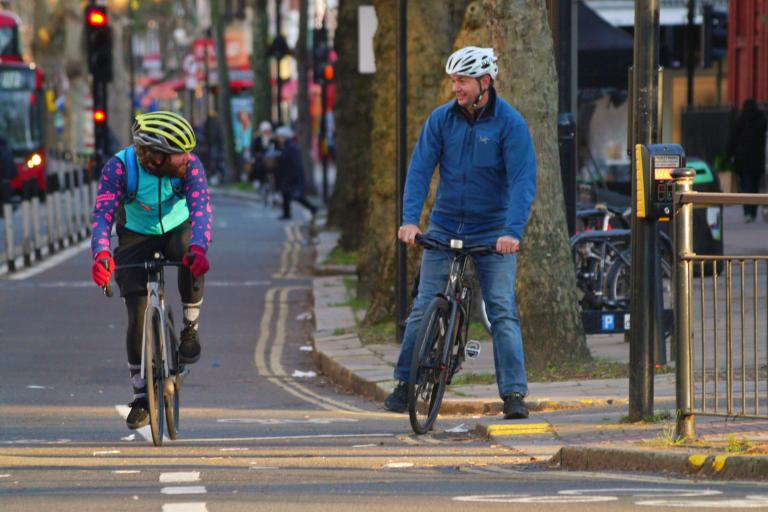
“How about other road users?” Road safety expert Robert Davis weighs in on Labour’s plan for drivers
As part of his ongoing appraisal of each parties’ manifestos and active travel pledges ahead of the general election, Dr Robert Davis, safe cycling campaigner and the chair of the Road Danger Reduction Forum, has had his say on Labour’s attempt to “clear up the mess” left by the Conservatives on the UK’s roads.
Here are his key takeaways:
- “On the side of drivers”: Oh please, how about other road users? Still, it’s to be expected.
- Highway maintenance: OK, but this no framework and isn’t costed.
- “Roads safer”: By reducing danger at source or the same old ‘road safety’ discriminating against people outside cars?
- “Speed up works”: Good luck with that – how would this happen?
- And then… TA DA! They say Labour will “reduce traffic”: I presume they mean MOTOR traffic, and we would welcome a return to the spirit of the Road Traffic Reduction Act. Let’s hold Labour to this!
12 June 2024, 12:37
Lunchtime bike maintenance tips: How to clean your chain
Judging by the current state of my chain, I may need to take some notes…
> How to clean your bike chain: a good way, a better way, and the ultimate way to save watts and money
12 June 2024, 11:56
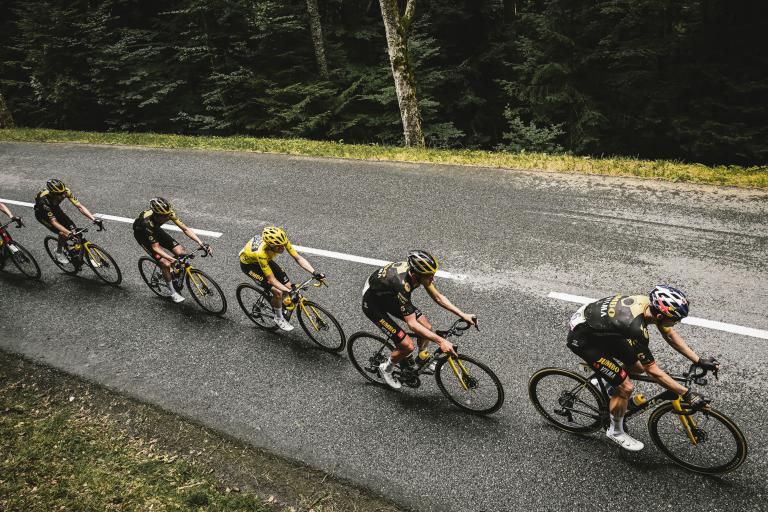
Vingegaard and Van Aert’s presence at Tour de France “fifty-fifty”, say Visma-Lease a Bike coaches
Despite training alongside Christophe Laporte at altitude in Tignes over the past week, the likelihood of both Jonas Vingegaard and Wout van Aert racing next month’s Tour de France remains “fifty-fifty”, according to the duo’s Visma-Lease a Bike coaches.
With the rest of their teammates set to join them for a pre-Tour training camp in the next few days, no decision has yet been made on Visma-Lease a Bike’s line-up for the grand tour, with the team’s management opting to wait until the last possible moment to assess Vingegaard and Van Aert’s condition in the wake of their horror crashes during the spring.
Reigning two-time Tour winner Vingegaard has not raced since his terrifying high-speed crash at the Tour of the Basque Country in April, where he suffered broken ribs, a broken collarbone, and a punctured lung, but returned to training in mid-May before taking in camps in Mallorca and at altitude.
Van Aert, meanwhile, returned to racing at May’s Tour of Norway, almost two months after crashing heavily at Dwars door Vlaanderen, fracturing his ribs, collarbone, and sternum, and ruling him out of a debut tilt at the Giro d’Italia (which was originally set to replace the Tour as part of Van Aert’s Olympic preparations).
Both riders’ coaches have told media outlets in Denmark and Belgium that their Tour presence remains up in the air, with just two and a half weeks until the race gets underway in Florence.
“For me, it’s fifty-fifty whether Jonas makes it to the Tour,” Vingegaard’s coach Tim Heemskerk told Danish newspaper BT.
“He needed to be able to follow the programme if he was to have hopes of being ready for the Tour. The first week at altitude was adaptation and recovery, and now he’s just had a tough week. And now there will be another one.
“The important thing will be how he reacts to it. Can he handle it? Will he get tired? The coming week and the one after are essential for the Tour. It's also important that he gets a feeling of ‘Wow, I feel more and more ready.’”
Meanwhile, Van Aert’s coach Mathieu Heijboer told Het Nieuwsblad: “We want to get them to the start of the Tour, but they have to be competitive. We will make a decision based on the powers they can achieve over a certain period of time and what their feelings and heart rate are. It is still too early to draw conclusions from their current data.
“We are still tinkering too much with their basic condition at the moment. The real fine-tuning has still to come.
“They are still a long way from being as good as they could have been in this moment without those injuries, but I don’t want to put it too negatively. At the moment I estimate for both of them individually that the chance that they will reach the Tour is just over 50 per cent.”
12 June 2024, 11:32
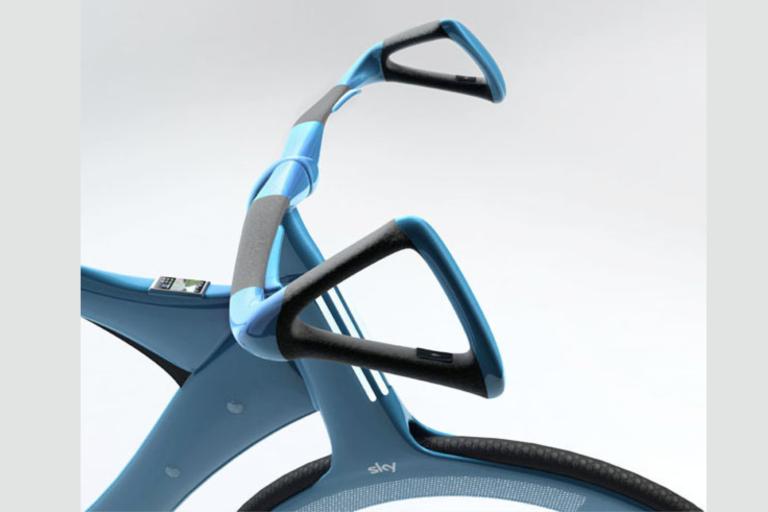
Chris Boardman revisits his “intelligent” Bike of the Future concept from 2009, including fingerprint locks, puncture-proof tyres, and solar-powered assistance
Remember Chris Boardman’s “intelligent”, space-age bike concept from 2009 (that, funny enough, wasn’t far off some of the TT machines he raced in the nineties) that the future Active Travel head believed could revolutionise urban cycling from the far-distant future of the 2020s and beyond?
Well, for a special edition of Bike at Bedtime, Boardman, being the great sport he is, agreed to delve back into his 15-year-old design – with its computer-like intelligence, ‘unbreakable locking device’, puncture-proof self-inflating tyres, spokeless wheels, solar-powered lights, and battery motor – to assess where he most resembled a cycling Nostradamus back in 2009… and where he didn’t.
Boardman also told us that if they left him loose with the pencil again, he’d “design something very different now”, perhaps with 3D printing, sustainable materials, and even AI at the forefront of his 2024 Bike of the Future..
Read more: > "I’d design something very different now": Chris Boardman revisits his 'intelligent' bike concept from 2009
12 June 2024, 10:50
Czech footballer ruled out of Euro 2024 in reported bike crash actually injured while riding tricycle down ski slope with teammates (yes, really)
Just when you thought things couldn’t get any stranger.
On Monday, you may remember, we reported on the live blog that Czech midfielder Michal Sadílek has been ruled out of his country’s Euro 2024 campaign after suffering a deep cut in his leg during what was initially reported to be a bike crash.
However, it has since been revealed that the 25-year-old FC Twente player – who was expected to be a key cog in the Czech machine at the upcoming championships in Germany – didn’t injure himself in a run-of-the-mill Michael Owen-esque crash.
Oh no. Sadílek instead sustained his tournament-ending injury while attempting to ride a tricycle down a ski slope in the Austrian mountain resort of Schladming, where the Czech national team were holding their pre-Euros training camp.
According to the Czech press, Sadílek and teammates Ladislav Krejci and David Jurasek had rented the tricycles to descend the area’s main Planai mountain, where Sadílek duly hit a hole, crashed, and was taken to hospital by ambulance, where he received 65 stitches.
After initially reporting the incident as a bike crash, the Czech team’s spokesperson apologised for misleading the media.
“It was a mistake that the national team did not provide complete information,” he said. “The accident occurred during the player’s free time... he did not violate the team rules or any other internal agreements.”
Sadílek, for his part, also apologised to his teammates and the country’s fans after the trike-related mishap.
“I made a mistake that I won’t take back. I weakened the team and prepared for the big tournament. I punished myself. Thank you to everyone who helps me, especially my family and closest ones,” he wrote on Instagram last night.
But hey, Michal, look on the bright side – you’re now a shoo-in for our upcoming ‘Footballers who crash tricycles XI’...
12 June 2024, 10:46
Plus ça change…
Reports that tramadol has been replaced in the peloton by an even more powerful painkiller has prompted the following response from someone who knows a thing or two about cycling’s chemical habits, and the ill-fated talk of ‘new generations’ and the like…
Plus ca change… https://t.co/OiA0coKk2k
— Paul Kimmage (@PaulKimmage) June 11, 2024
Meanwhile, Dan decided to pop out to the chemist and pick up some tapentadol for a special road.cc review – here’s what he found:
A bit expensive, but you can’t argue with its quality. Four-and-a-half stars. Could barely feel my legs all day until I crashed into a bush due to the drowsiness. Thankfully the long-lasting pain relief saw me through to the hospital.
Great stuff – I wonder if it’ll make the 2024 road.cc Recommends awards list? It might have tough competition from the human growth hormone doping rings that have been popping up lately, though…
12 June 2024, 10:02
UCI concerned new drug “ten times more powerful than tramadol” could be used by professional cyclists to mask fatigue during races, report suggests
Four-year bans for Tour de France stage winners? The UCI concerned about new, super powerful drugs proliferating throughout the peloton? Have I accidentally stumbled into 2008 over the past few weeks?
Unfortunately not, as reports coming out of Switzerland suggest that cycling’s governing body is worried about the possibility of a powerful new painkiller making its way into pro races, with riders and teams having been warned of the governing body’s “concerns” about the drug “ten times more powerful than tramadol”, the painkiller that led to Nairo Quintana’s disqualification from the 2022 Tour and subsequent year-long exile.
Tapentadol – a “very powerful” painkiller used to treat extreme pain, often in cases of severe osteoarthritis or bone cancer – has been on the UCI’s watchlist for months, reportedly, due to concerns about its use to mask fatigue during races, with the governing body alerting teams, riders, and organisers about its concerns last month.
Read more: > UCI concerned new drug “ten times more powerful than tramadol” could be used by professional cyclists to mask fatigue during races, report suggests
12 June 2024, 09:59

Special measures put in place to ensure Tour de France gravel stage in Troyes will go ahead during second round of French election
While L’Étape du Tour and its 15,000 amateur participants have been forced to change their plans thanks to the second round of France’s snap general election on 7 July, the main event will continue as planned, naturally, after Tour de France organisers ASO and the local authorities in Troyes combined to ensure the smooth running of both the polls and the Tour’s much-anticipated gravel stage in the region.
Elections interfering with French bike races is nothing new, of course – in 2021, La Course (the forerunner of the Tour de France Femmes) was shifted a day later, and its route changed, due to local elections in France, while the 2022 presidential election forced Paris-Roubaix to swap dates with the Amstel Gold Race.
But with the power, influence, and might of the Tour weighing heavy, not to mention the logistical nightmare of shunting the three-week behemoth around in such short notice, it’s no surprise that the race’s ninth stage through the gravel roads around Troyes – which takes place during the second round of voting on Sunday 7 July – will go ahead, with special measures put in place to ensure locals can still make it to the polls despite the day-long road closures.
(Zac Williams/SWpix.com)
“François Baroin, Mayor of Troyes, President of Troyes Champagne Métropole and President of the Mayors de l’Aube, and Christian Prudhomme, Director of the Tour de France, want to reassure all the actors and spectators: the Tour de France will go ahead as planned in Troyes and in the Aube on Sunday 7 July and everything will be implemented to ensure the success of this stage, which is a chance for the territory and the 34 municipalities crossed, as well as the good conduct of the electoral vote,” the Ville de Troyes local authority confirmed last night.
The council says it has worked together with ASO, the French state, security services, and the local mayors to “allow both the fluidity of traffic along the road, the better information of citizens, and therefore the good conduct of the electoral vote”.
According to Ville de Troyes, there will be an “increase in the number of crossing points along the course of the stage, extended access to these crossing points up to 10 minutes before the passage of the caravan and the peloton then reopening 10 minutes after, and reinforced signage with the public”, while the polling stations will be permitted to remain open later than planned to enable everyone to vote.
I’m sure all the Étape participants are delighted…
12 June 2024, 08:49
Politics messing up cycling, Part 2: Fury as L’Étape du Tour date changed to accommodate French general election
All these bleeding general elections never seem to work in the favour of cyclists, do they?
While here in the UK we’re subject to an endless line of politicians sermonising on how tough motorists have it, over in France President Emmanuel Macron decided to anger 15,000 amateur cyclists from around the world – by calling a snap general election on the day L’Étape du Tour was due to take place.
Thanks to the election, the organisers have decided to move the date of the famous sportive, which takes place annually over the route of one of the hardest stages of that year’s Tour (the 2024 edition featuring the mountainous penultimate stage of the race from Nice to the Col de la Couillole), from Sunday 7 June to the Saturday to accommodate local voters making it to the polling stations.
And it’s fair to say that thousands of amateurs – now facing a logistical and financial headache – aren’t best pleased…
For plenty of F-bombs from disgruntled British sportive enthusiasts, read on: > Frustration as last-minute L’Étape du Tour date change due to French election leaves thousands of cyclists with logistical headache
After obtaining a PhD, lecturing, and hosting a history podcast at Queen’s University Belfast, Ryan joined road.cc in December 2021 and since then has kept the site’s readers and listeners informed and enthralled (well at least occasionally) on news, the live blog, and the road.cc Podcast. After boarding a wrong bus at the world championships and ruining a good pair of jeans at the cyclocross, he now serves as road.cc’s senior news writer. Before his foray into cycling journalism, he wallowed in the equally pitiless world of academia, where he wrote a book about Victorian politics and droned on about cycling and bikes to classes of bored students (while taking every chance he could get to talk about cycling in print or on the radio). He can be found riding his bike very slowly around the narrow, scenic country lanes of Co. Down.
Latest Comments
- mattw 28 min 59 sec ago
It's owned by the same company. It is hyper-junk.
- mark1a 22 min 39 sec ago
Yes, I agree, and thanks for replying, what I was trying to say (badly) was that Look wasn't really a bike company back then. ...
- kingleo 3 hours 27 min ago
You never mentioned that a cyclist was stabbed to death by a pedestrian a few years ago in Richmond Park. Also when the park was left open...
- kingleo 3 hours 49 min ago
Protesters telling us that a new cycle path will have devastating consequences on wildlife - motor vehicles are already doing that, but no protests...
- George Hill 4 hours 26 min ago
Foxcote Hill in Ilmington - it's steep, it's not too long, and once you get to the top you can see the for miles across the Cotswolds....
- stonojnr 4 hours 34 min ago
well at least they didnt go for British Racing Green as well ,as then theyd have two trademark licensing cases up against them....
- Laz 5 hours 32 min ago
I think the best solution would be to automatically charge every driver who hits a cyclist on the road with attempted murder, and plain murder in...
- David9694 6 hours 45 min ago
Car crashes into front of home in Briggs Mead, Wymondham...
- nowasps 6 hours 56 min ago
I've worked my way through a gifted box of these, and the review tallies exactly with my own experience.
- E6toSE3 7 hours 28 min ago
Quite wrong. The really interesting stuff was good goggles for under £80 - my budget and I was previously limited to Tifosi. Had to ask about...
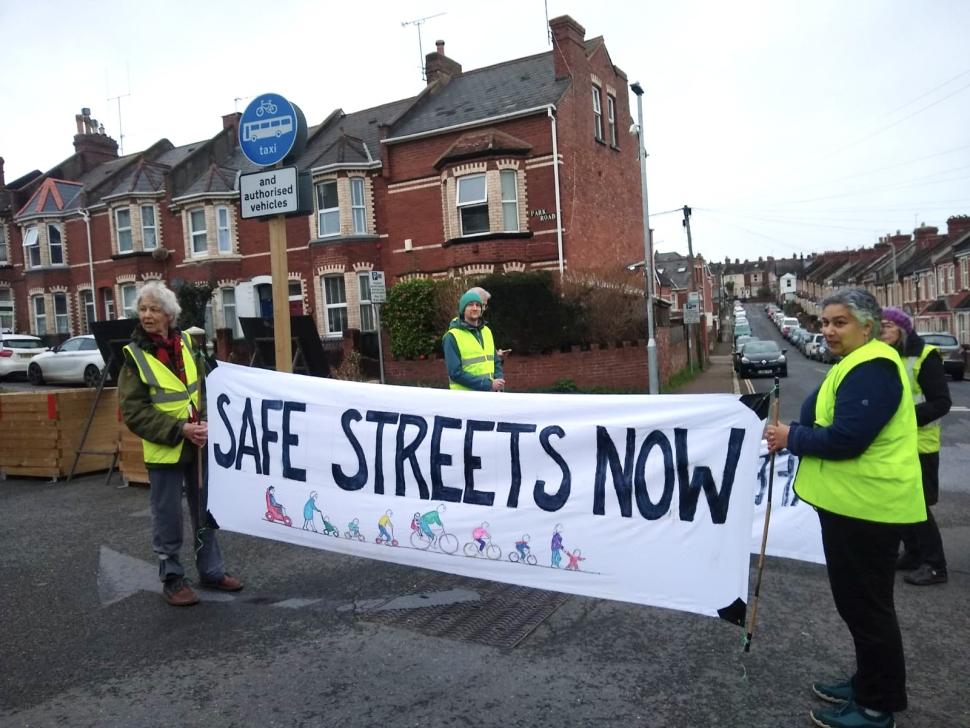
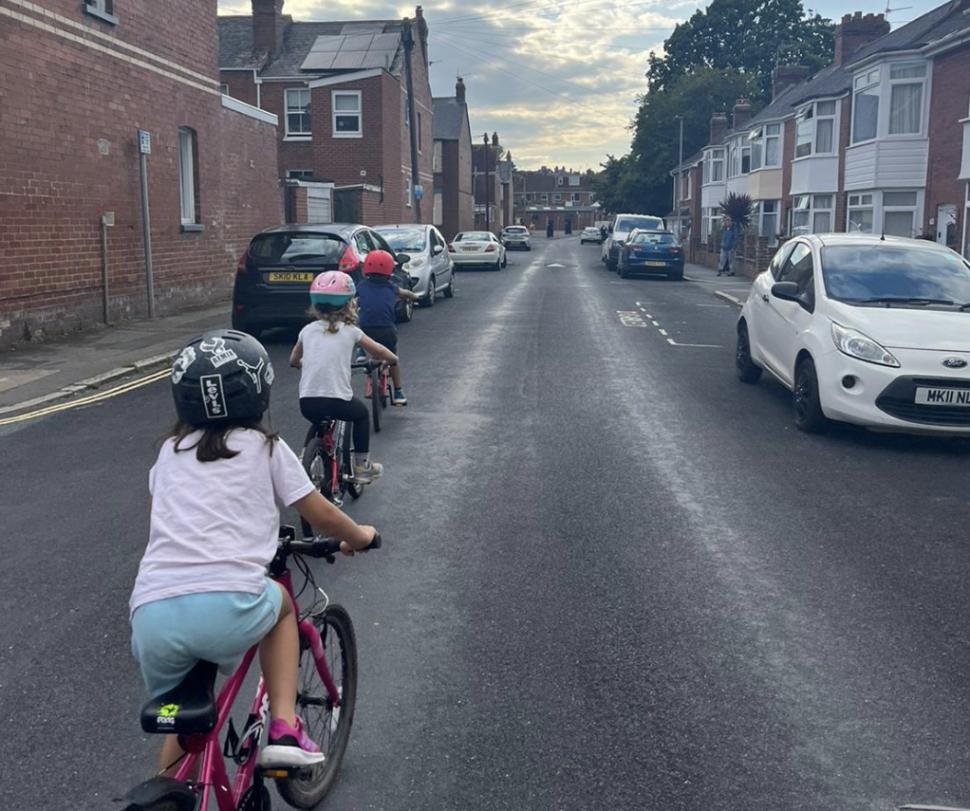
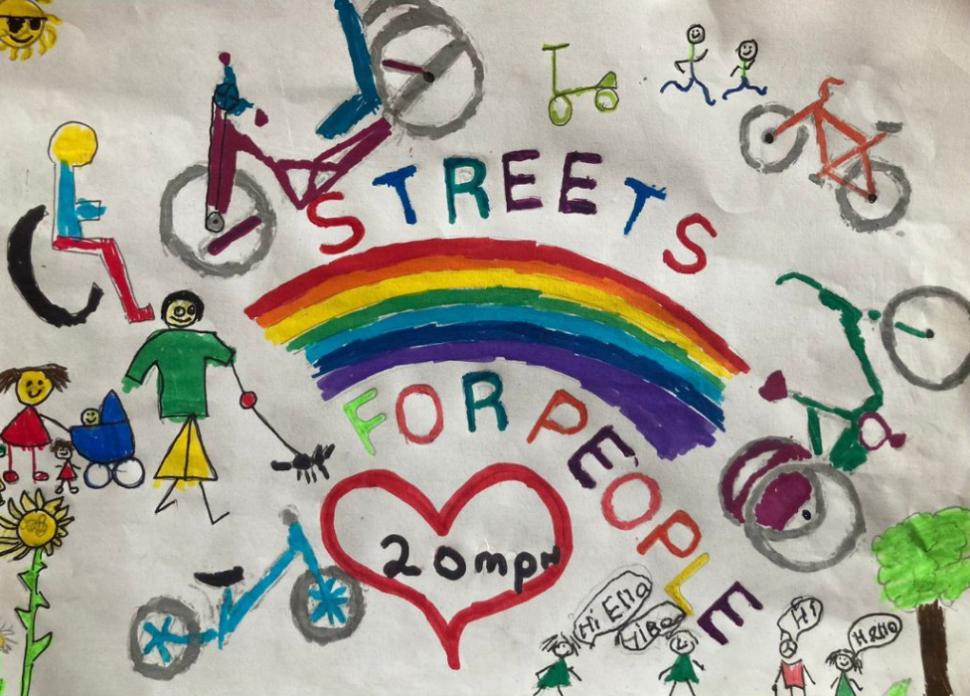
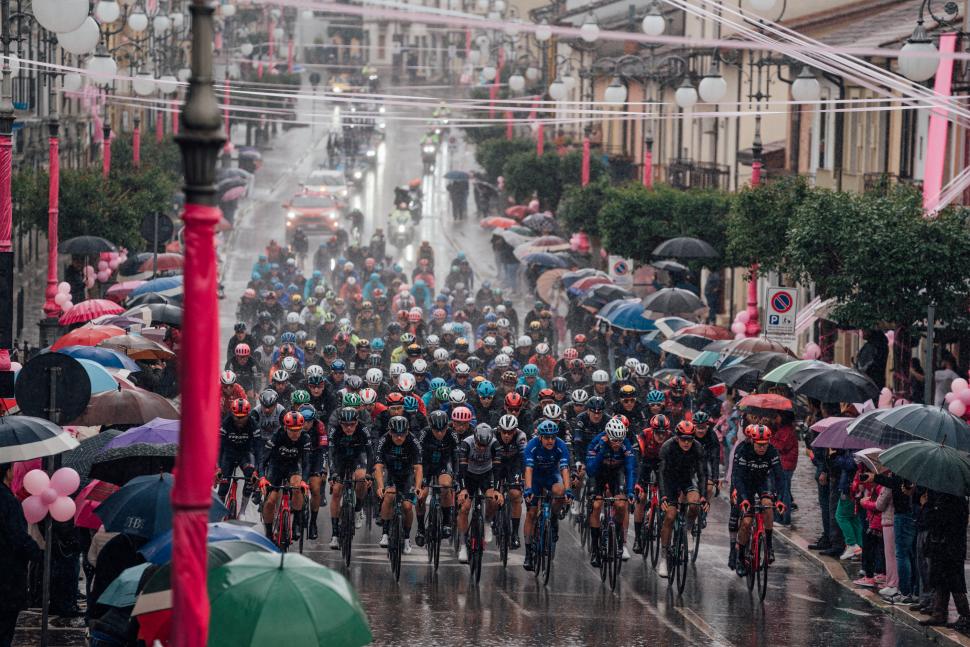

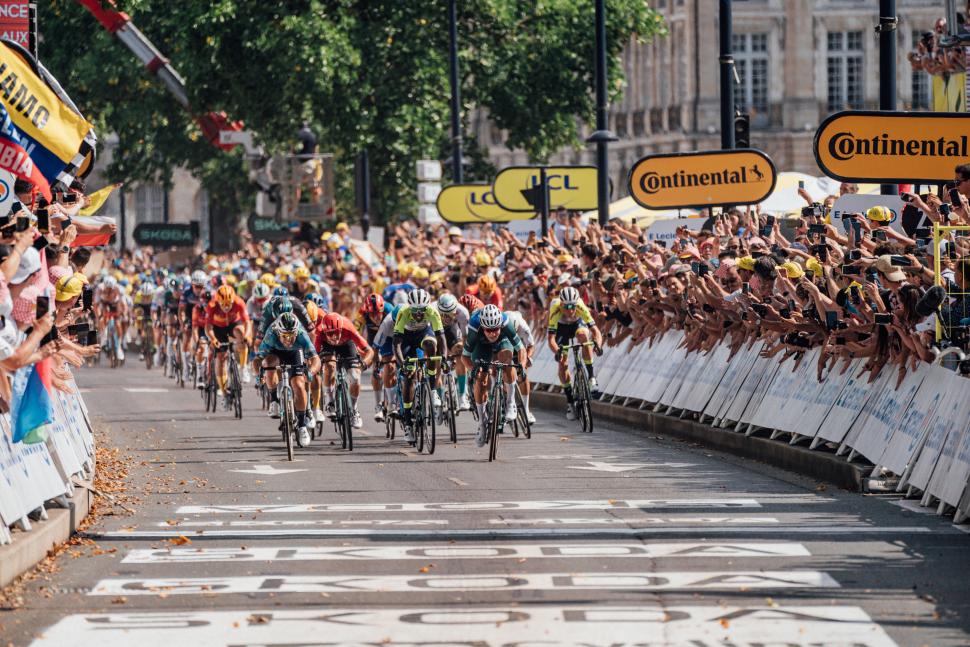
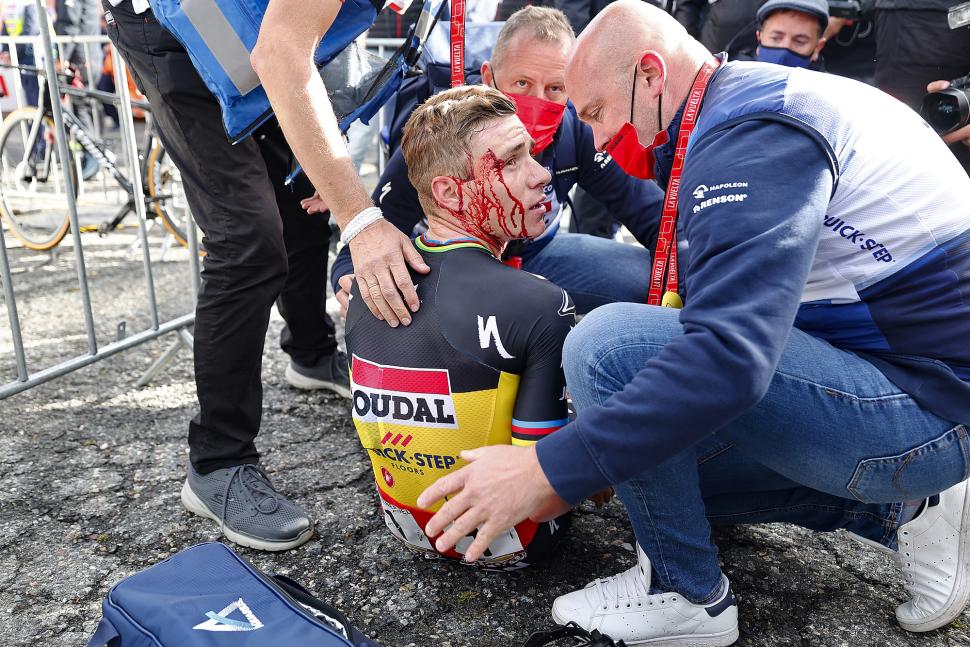
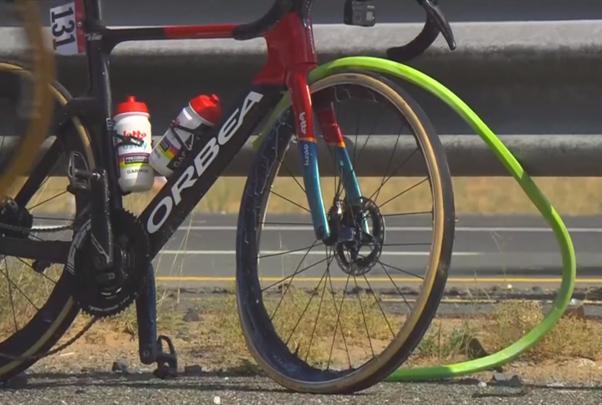

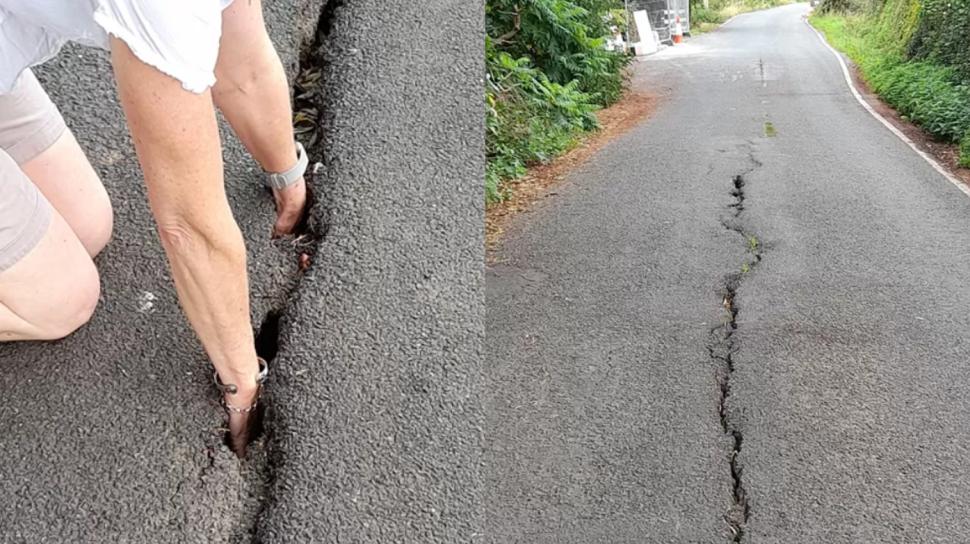
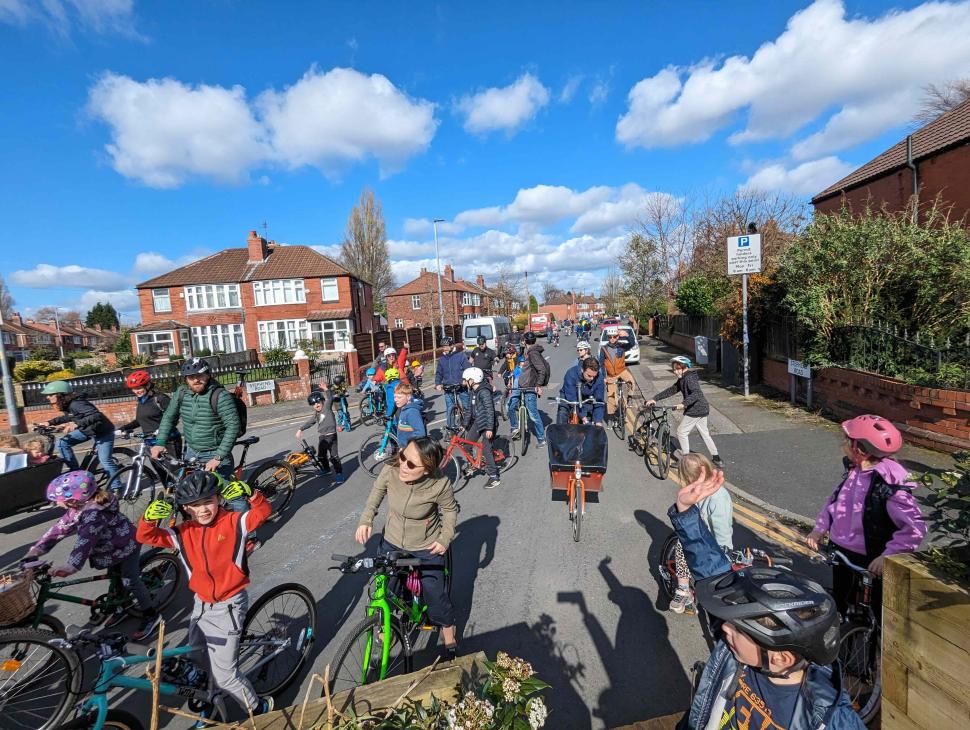

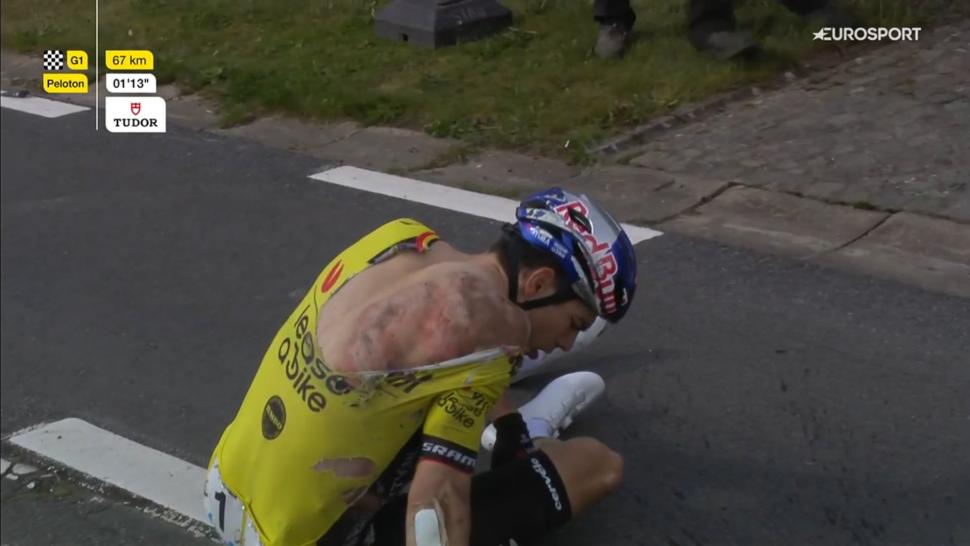

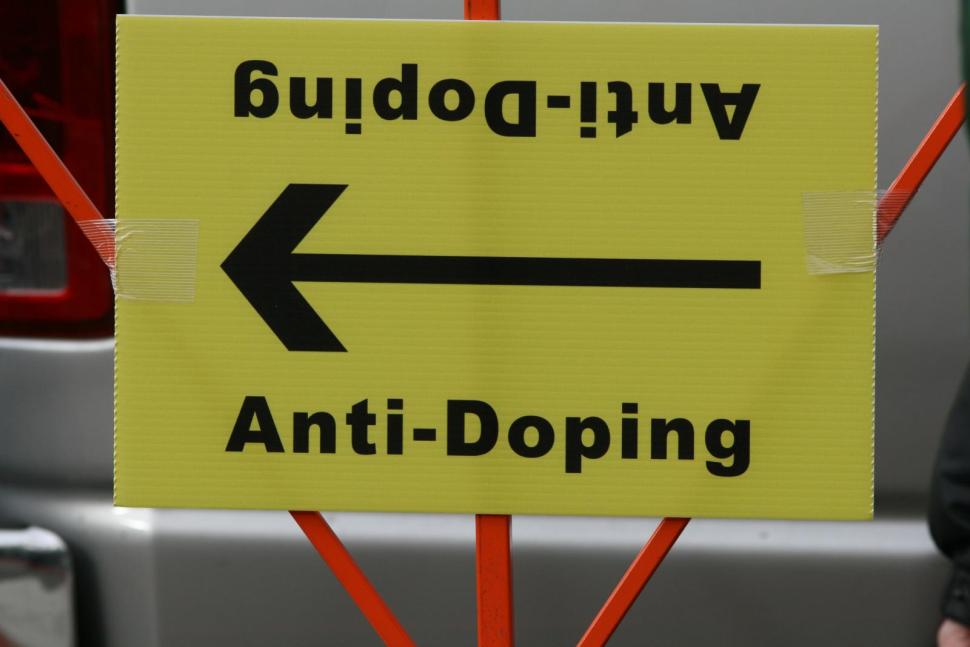

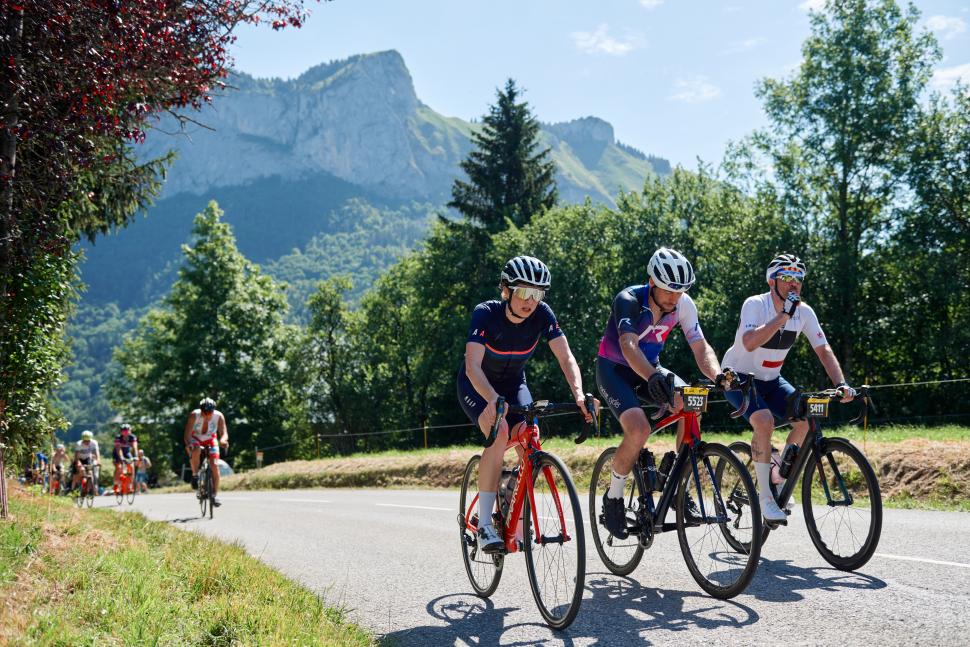
Add new comment
67 comments
If you see the Green's manifesto published today, it reflects the platform on which Mr Starmers party should be standing.
Sadly, Mr Starmer has stolen many Tory policies and is now ignoring the ground on which the late Labour party stood, just to get into power. Once in power, he will not be any differnt from any of the last four Tory PM's.
Vote Red, sadly get Blue.
It's unnerving that green/environment issues aren't at the forefront of this election.
It's unnerving that green/environment issues aren't at the forefront of this election.
[/quote]
Exactly, the next 5 years are going to be critical in limiting global warming and none of the parties want to talk about it.
I wonder how many of them have bought apocalypse shelters in New Zealand so they'll be fine (I bet the Sunaks have one) and the people who can't afford to do that probably won't vote Tory anyway.
(the Grauniad ran a story today about how the two subjects not being spoken about during this campaign are the climate emergency and Brexit).
Talking of Sunak, I've just been reading what a deprived childhood he had. Apparently he didn't even have Sky TV. He really is a man of the people.
Feel sorry for the Kiwis as all the rich detritus of world will be setting up home there come the apocalypse
After the apocalypse all the sheep will be dead so the Kiwis will need something to eat!
Slightly off piste but this is the state we are in, near where I live they are building 300 new houses ( Persimmon ) and not a single solar panel between them. Drive a couple of miles down the road and 800 acres of arable lend has been given permission to turn it into a solar farm ( effectively armour plating the countryside ). You cannot make this stuff up !
Well - look at the European elections. Lots of pushback because people are "feeling the pinch" / don't trust the existing lot. Not a few people think "environment" stuff is a con - or at best used cynically against people for the benefits of our "betters".
Unfortunately the current "high living costs" come at a time when we've essentially run up big debts AND run down various services people think are important. And I think we're only just starting to realise what the costs will be if we want to adapt to climate change, never mind get onto a different ship.
I guess it's "political reality" - trying to bring up bigger issues or stating that if we want to "fix things" they may get worse first - to people who are already restive? Just means you're out of power.
Don't forget that election time is prime opportunity for the FSB to spread their message that democracy is broken and other forms of government are strong and going to plan. Easy to agree that the majority of politicians on all sides are incompetent chancers compromised by the globalisation delusion. Wouldn't a strong independent leader be more to your advantage...
Thus Orban and Trump are supported with cash and disinformation to foster their cults and bring chaos that FSB can exploit.
As a naive youth I voted for Holy Blair - because clearly the "sleazy Tories" had to go! Now I'm looking at parallels again.
Let's hope that if Keith gets (as is likely - but not guaranteed) in he at least avoids facilitating a couple of decades of bloodletting. (If we could have skipped the PFI madness that would have been good as well...)
My wife and I were talking about it last night.
Our constituency is staunchly Tory, unfortunately, and has been for over thirty years. At this election there are five non-Tory candidates (Lab, Lib-Dem, Green, Workers Party (is that George Galloway's lot?) and Reform UK (UKIP as was)).
If everyone opposed to the Tories tactically votes for just one of them - or possibly even two - then we could finally remove our MP.
But they won't, which divides the not-Tory vote among five and ensures (thanks to FPTP) that we will have a Tory MP again…
The most likely to be the One, to garner the most non-Tory votes, is the Labour candidate. But I'm not sure I want to vote for Labour any more and if I vote according to my conscience then I'm just another person dividing the opposition.
It's very frustrating, and rather depressing
If you vote with your conscience/beliefs then at least you won't be disappointed if they do win.
Sounds like your only option is to promote Reform in hope they can split the Conservative vote.
You lucky, lucky, lucky B@rstard!
In the last election the useless half wit who earns a supplementary income double the UK median wage from an oil company whilst pretending to represent my constituency polled 75% of the vote. Even if Reform split the vote 50:50 with him and everyone else votes tactically we still end up with a right wing racist as our MP
He definitely will be different from the last four Tory PMs. Even if you were right that he is effectively a Tory (which I don't agree with) he would still be a massive improvement on the recent residents of No 10.
[/quote] He definitely will be different from the last four Tory PMs. Even if you were right that he is effectively a Tory (which I don't agree with) he would still be a massive improvement on the recent residents of No 10.[/quote]
I hope I live long enough to be proven incorrect but sadly, I see little hope for change with Mr Starmer.
Being not quite as bad as the worst, most corrupt and incompetent bunch of politicians that we've ever had isn't really much of a recommendation.
https://www.theguardian.com/commentisfree/article/2024/jun/12/green-part...
Why can't one of them at least be like "We are on the side of SAFE drivers" and then lay out a set of plans which will actually improve the road network by removing the dangerous drivers from it.
It would force the detractors to say outloud "Actually, I don't agree with this because I want to put people's lives at risk."
Because that's not the important part? Because the "safe drivers" part is inherently limited by:
a) the fact of mass motoring (just can't expect humans en-mass to be particularly careful) and
b) the choices we've made in overall ethos beyond that. Compare UK's "maximising capacity for motor traffic with sufficient safety" vs. e.g. a Sustainable Safety approach of "safe and efficient movement of people, according to the requirements of their chosen mode".
Of course reducing a system to a phrase is foolish - but in the UK the effect has been to prioritise one mode - driving - over all others. We have indeed achieved "safe roads" but due to the first constraint that has effectively occurred by discouraging use of other modes. Where there's still conflict safety is achieved by moving everything else out of the way of drivers and their parked vehicles, or making them wait...
I'm not saying its ideal and I agree with you that a wholesale change would be ideal but, at least could they take a *step* in the right direction rather than running headlong into NHS failure, climate destruction and vulnerable road user obliteration.
I keep having to repeat to myself this year "At least the lesser of two evils is less evil. At least the lesser of two evils is less evil."
Totally agree, the whole approach to transportation is to treat it as a steaming great turd and successive governments from both sides of the benches just keep polishing the turd instead of flushing it away.
There is plenty of examples world wide on what could be described as integrated transportation that works safely it's not if something needs inventing. It needs the courage of conviction and in general politics is not particularly courageous when something radical needs to be done that might be construed as a vote loser. Depressing as it may seem we can only hope if labour get in they have copious tins of Brasso ?!
Or lots of glitter to roll it in.
I'm less confident that "small steps" initiated by central government are capable of being able to make us change direction. (Fortunately - cycling is relatively low cost and decentralised, so may be able to survive despite central policy). Witness the rounds of "encouraging cycle travel" which have occurred every few decades throughout my life: overall achieving nothing, or less.
As for removing the dangerous drivers - through conversation here I am now a bit more skeptical about that:
a) Just how much that would cost (in terms of police, courts, side effects on "other honest citizens" etc.) and
b) Just how much "low hanging fruit" (room for improvement before "diminishing returns") is there? (Basically - given that overall UK roads are "statistically very safe" just how much things could be changed? Also what's the relative damage done by the fewer "out-and-out wrong'uns" vs. the mass of "otherwise law-abiding drivers having a bad day (honest)")
Absent our new robot overlords taking over the driving (incentivised like "now you don't need to be distracted from your phone at all!") I can't see much chance of change in the "mass motoring" approach because "politics". (I'd love to see driving training / tests more than once a lifetime but even that is probably fantasy).
I think the best hope is ... the only approach that has actually worked elsewhere: improve public transport everywhere and better integrate this with other transport modes, take space for active travel from motor traffic where necessary (and tame the car elsewhere) - oh, and implement a sustainable safety approach.
I'm sure such a system would be as popular here as elsewhere, once it had been in place for a couple of years. But I'm less certain now we can get over the initial hurdle in the UK (public reaction against change).
The key advantage of driverless vehicles is that the software will do as it's told without question while the passengers have to accept that because the manufacturer is liable for incidents they alone must control the software and vehicle behaviour.
Meaning that Vulnerable Road Users are the top priority of driverless vehicles.
The sooner there are no human drivers on the public highway the safer we all will be.
Maybe. But what we've learned from e.g. the Volkswagen emissions shenanigans and some of the more recent tech stuff is that the top priority of complex systems is to benefit the people who design and sell them.
If you're just going to fill potholes why not just say you're on the side of road users.
They could always be tough on the causes of potholes, cars getting heavier, torquier and more numerous, traffic speeds increasing. It seems as if people think potholes are things that just appear. Take some of the cars away and the roads last longer and cost less to maintain.
Once again active transport is the answer, pretty much whatever the question is.
Pages